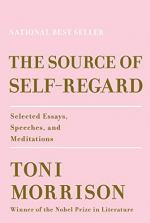
|
| Name: _________________________ | Period: ___________________ |
This quiz consists of 5 multiple choice and 5 short answer questions through Section 2: Part I--The Foreigner’s Home, including the essays “Moral Inhabitants” through “The Slavebody and the Blackbody”.
Multiple Choice Questions
1. What question does Morrison say is at the center of of government?
(a) Cultural apartheid or integration.
(b) Creating peace and security.
(c) Control over history's narrative.
(d) Distribution of wealth.
2. In "The Individual Artist," why does Morrison say that the romantic vision of the artist is a "Procrustean bed"?
(a) Because the romantic ideal is old-fashioned.
(b) Because it implies that artists suffer because they are lazy.
(c) Because it makes a legend out of ordinary reality.
(d) Because it denies artists their individuality.
3. In "Moral Inhabitants," what is the list of American leaders meant to demonstrate?
(a) Great leaders are "ahead of their time."
(b) History only shows us one side of these leaders.
(c) Great leaders are born, not made.
(d) Slavery was a violent and degrading institution.
4. Based on your reading of "Arts Advocacy," which statement would Morrison agree with?
(a) Art is a steadying force in society.
(b) Real artists are able to create regardless of their circumstances.
(c) Artists are not responsible for a dialogue with society.
(d) The existence of art in a society is precarious.
5. In "The Slavebody and the Blackbody," when Morrison suggests that writing about slavery cuts away at the scar tissue the blackbody uses to hide the slavebody, what technique is she using?
(a) Logos.
(b) Allusion.
(c) Figurative language.
(d) Ethos.
Short Answer Questions
1. Morrison claims that after WWII, the language used to discuss war became more what?
2. In "The Slavebody and the Blackbody," Morrison says what about slavery?
3. In "Arts Advocacy," Morrison recounts discovering that a highly regarded artist vetoed funding for another artist for what reason?
4. According to Morrison, globalism creates a fear of what?
5. In her "Sarah Lawrence Commencement Address," Morrison says that one of her aims is to do what?
|
This section contains 380 words (approx. 2 pages at 300 words per page) |

|




